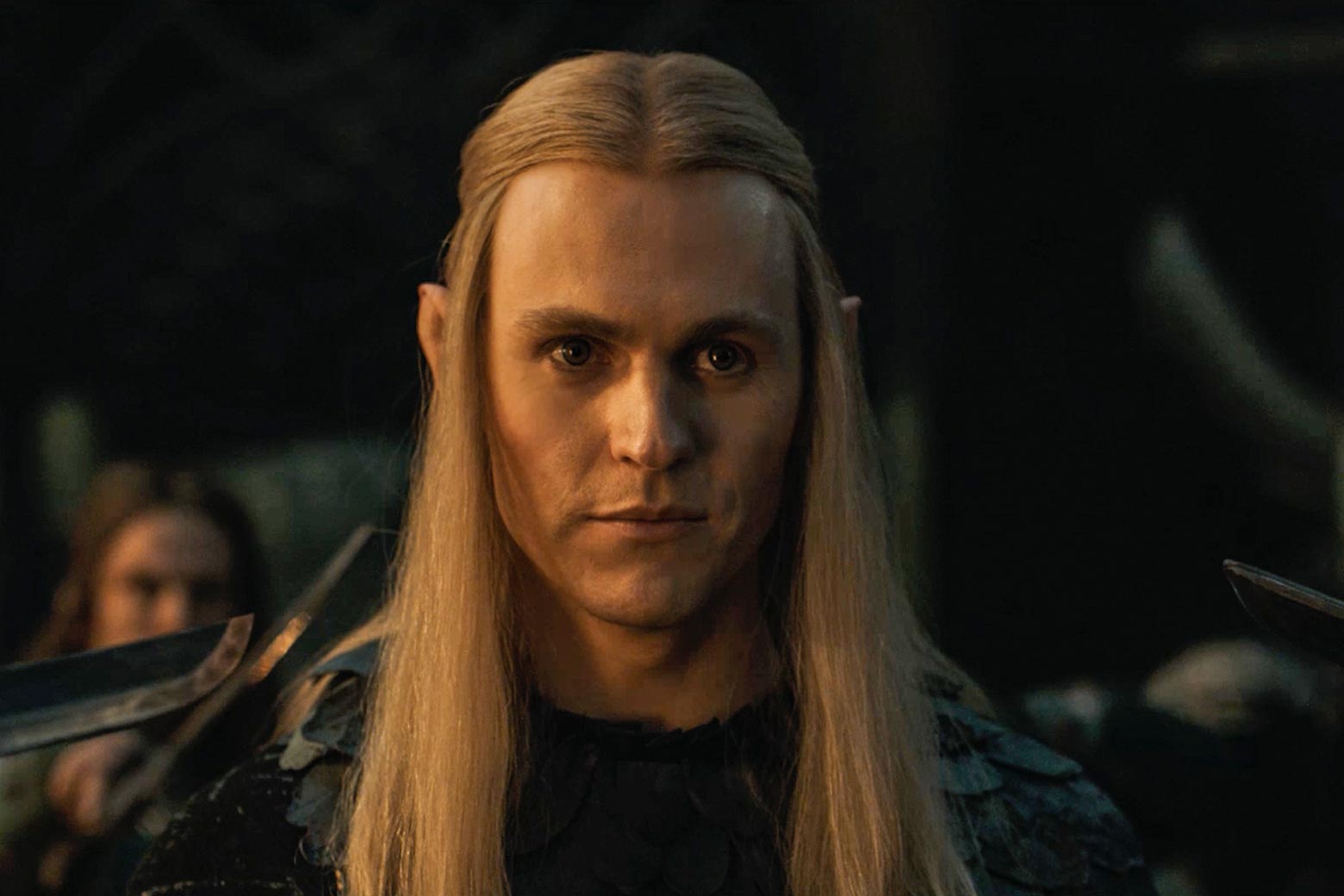Amazon’s The Lord of the Rings prequel gives some much-needed complexity to Sauron.

Listing the things wrong with The Lord of the Rings: The Rings of Power’s second season feels like a job in itself. Between its ponderous pacing, its unwieldy storylines, and its irritating penchant for almost saying Gandalf’s name, it’s a season that’s felt like more of a primer for future seasons than a contained story of its own. But if Amazon’s series almost gets one thing right, it’s Sauron.
Played by Charlie Vickers, Sauron spent most of Season 1 disguised as the allegedly lost king of the Southlands, Halbrand. Having struck up a partnership with Galadriel (Morfydd Clark) in more ways than one, before eventually betraying her, he launches into Season 2 in fairer form—first, as seen in a flashback (played by Jack Lowden), and then as Annatar, as whom he masquerades as an emissary from the deity-like Valar. Though Galadriel has unmasked Halbrand to the elves of Lindon, as Annatar he gains the trust of Celebrimbor (Charles Edwards), master smith and lord of Eregion. There he weaves a web of deceit over the elves in Celebrimbor’s charge and manipulates their lord into creating the titular Rings of Power.
In our many visits to Celebrimbor’s forge throughout the season, Sauron demonstrates why he is known as “the Deceiver.” In a season that explores Rhûn, introduces Tom Bombadil to our screens, and gives us a glimpse of an Entwife, it is Sauron’s relationship with Celebrimbor that proves to be the most memorable aspect of the series. In particular, as Sauron flatters and intimidates and flounders, it is a short moment in Episode 7—nestled within the overblown Sack of Eregion—that reveals Sauron in his true form. No, he doesn’t burst into a flaming eye, nor don a spiky crown as in Peter Jackson’s trilogy. Instead, The Rings of Power unveils a Sauron with depth; a fully fledged character rather than simply a big bad.
The moment starts shakily, with Sauron feigning regret over how he has treated Celebrimbor, who is reeling from discovering Annatar’s deception. The smith scoffs: “Like you have treated countless others?”
“Like Morgoth treated me!” Sauron replies.
In Tolkien’s lore, Morgoth, whose name means “Dark Enemy” in Elvish, was the Dark Lord of the First Age. Sauron served as his lieutenant, playing a major part in the War of Wrath. Sauron painting himself as his former boss’s victim—especially right on the heels of him taking on the role of Celebrimbor’s abusive boyfriend, complete with a sequence of him essentially saying “look what you made me do”—has to be the greatest attempt at gaslighting in Middle-earth. But Celebrimbor, eyes now open to the truth, is unimpressed. “You truly are the Great Deceiver,” he says. “You can even deceive yourself.”
It’s a sudden shift from strange characterization to an insight that strikes at the heart of Sauron’s character, for deceiving himself is exactly what he is doing.
Bringing Sauron into The Rings of Power unburdened by the baggage of both its source material and previous screen adaptations was never going to be an easy task. He has always been presented as an almost-disembodied bogeyman to Middle-earth’s Free Peoples, a blunt image of little more than an evil to be vanquished—a portrayal that belies the complexity of Sauron in the broader mythos.
Sauron is, after all, a Maia, part of the same celestial order as Gandalf, Saruman, and the Balrogs. These are angelic beings created by Eru Ilúvatar before the beginning of the world, along with the Valar, whom the Maiar serve. In some analyses, Eru is an analogue of the Christian God and the Ainur—the Valar and the Maiar collectively—angels. One does not fall from that position without some juicy motivations. Indeed, he once served the Vala Aulë, the Smith of the Valar, but ultimately aligned with Morgoth in the fallen Vala’s rebellion against Eru. Sauron’s own fall wasn’t fueled by resentment of Eru, however; rather, he saw Morgoth as the quickest path to achieving the order he craved. As Tolkien writes in The History of Middle-earth, “Sauron had never reached [Morgoth’s] stage of nihilistic madness. He did not object to the existence of the world, so long as he could do what he liked with it.”
In The Rings of Power scene, Sauron says much of the same to Celebrimbor: “For what he wanted to destroy,” he says, “I wished to perfect.”
Sauron’s desire plays out in the almost pathological way he pursues the Rings of Power—tools through which he believes he can control the kingdoms of elves, dwarfs, and men, and so bring peace and order to Middle-earth. Sure, it’s not exactly a good thing to enslave the entire world to achieve peace. But to Sauron, who detests waste, it is the most efficient. This single-minded pursuit of order is also a significant glimpse at the fallibility that will lead to his undoing—something The Rings of Power captures with aplomb.
For all its faults, The Rings of Power—aided by Vickers, who remains the most compelling part of this series—has worked hard to disabuse viewers of the one-dimensional, solely villainous reading of Sauron. Though essentially a demigod, Sauron is surprisingly human throughout the show. He is prone to doubt, desire, even fear. He is distracted by Galadriel, his consternation is clear as progress on the rings falters, and he even seems sincere in some of his admiration for Celebrimbor. These dimensions help flesh out a Sauron before he becomes truly obsessed to the point of pure evil.
Indeed, this is where The Rings of Power excels: not when it tries to fashion something new to fill holes out of the bones of what Peter Jackson left behind—do not talk to me about elves feeling threatened by Barrow-wights—but when the series expands what we already know but have few details about. Unfortunately, those moments contrast with how The Rings of Power alters Tolkien’s world to manufacture drama. Season 2 may have brought us a fascinating exploration of Sauron’s manipulation of Celebrimbor, but it has also mired us in the muck of Isildur (Maxim Baldry) getting a girlfriend and Tom Bombadil (Rory Kinnear) acting as a fanservice-laden Yoda to Daniel Weyman’s fledgling Gandalf. If the former feels like an excavation of the parts of Tolkien’s world that we’ve craved a better look at for decades, the latter feels no different than the shallow imitations The Lord of the Rings inspired in the decades since its publication.
As nuanced as Sauron feels in The Rings of Power, however, it remains only a glimpse of what he could be if contextualized properly. Perhaps that’s fodder for the alleged three seasons still planned, despite the series’ falling viewership. But these brief interludes, interesting as they are, are lost as a 4,000-year timeline is vacuum-packed into a few decades. Not least as the full scope of Sauron’s complexity is persistently boiled down by Galadriel and Elrond (Robert Aramayo), in between smooches, declaring just how much of a bad boy Sauron really is. (I guess Galadriel would know.) The Great Deceiver, the major calamity of The Lord of the Rings, is still reduced, even as The Rings of Power expands up on him. Even Sauron, like all else in this series, is a slave to The Rings of Power’s baffling rhythm.




